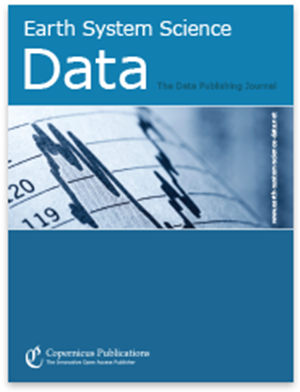MUDA: dynamic geophysical and geochemical MUltiparametric DAtabase
IF 11.6
1区 地球科学
Q1 GEOSCIENCES, MULTIDISCIPLINARY
引用次数: 0
Abstract
Abstract. In this paper, the new dynamic geophysical and geochemical MUltiparametric DAtabase (MUDA) is presented. MUDA is a new infrastructure of the National Institute of Geophysics and Volcanology (INGV), published on-line in December 2023, with the aim of archiving and disseminating multiparametric data collected by multidisciplinary monitoring networks. MUDA is a MySQL relational database with a web interface developed in php, aimed at investigating in quasi real time possible correlations between seismic phenomena and variations in endogenous and environmental parameters. At present, MUDA collects data from different types of sensors such as hydrogeochemical probes for physical-chemical parameters in waters, meteorological stations, detectors of air Radon concentration, diffusive flux of carbon dioxide (CO2) and seismometers belonging both to the National Seismic Network of INGV and to temporary networks installed in the framework of multidisciplinary research projects. MUDA daily publishes data updated to the previous day and offers the chance to view and download multiparametric time series selected for different time periods. The resultant dataset provides broad perspectives in the framework of future high frequency and continuous multiparametric monitorings as a starting point to identify possible seismic precursors for short-term earthquake forecasting. MUDA is now quoted with the Digital Object Identifier https://doi.org/10.13127/muda (Massa et al., 2023).MUDA:动态地球物理和地球化学多参数数据库
摘要本文介绍了新的动态地球物理和地球化学多参数数据库(MUDA)。MUDA是国家地球物理和火山学研究所(INGV)的一个新的基础设施,于2023年12月在线发布,旨在归档和传播多学科监测网络收集的多参数数据。MUDA 是一个 MySQL 关系数据库,采用 php 开发网络接口,旨在准实时调查地震现象与内源参数和环境参数变化之间可能存在的相关性。目前,MUDA 从不同类型的传感器收集数据,如水体物理化学参数的水文地质化学探测器、气象站、空气氡浓度探测器、二氧化碳(CO2)扩散通量探测器和地震仪,这些传感器既属于 INGV 国家地震网络,也属于在多学科研究项目框架内安装的临时网络。MUDA 每天发布前一天的最新数据,并提供查看和下载不同时间段多参数时间序列的机会。由此产生的数据集为未来的高频和连续多参数监测提供了广阔的前景,并以此为起点,为短期地震预报确定可能的地震前兆。MUDA 现以数字对象标识符 https://doi.org/10.13127/muda 引用(Massa 等人,2023 年)。
本文章由计算机程序翻译,如有差异,请以英文原文为准。
求助全文
约1分钟内获得全文
求助全文
来源期刊

Earth System Science Data
GEOSCIENCES, MULTIDISCIPLINARYMETEOROLOGY-METEOROLOGY & ATMOSPHERIC SCIENCES
CiteScore
18.00
自引率
5.30%
发文量
231
审稿时长
35 weeks
期刊介绍:
Earth System Science Data (ESSD) is an international, interdisciplinary journal that publishes articles on original research data in order to promote the reuse of high-quality data in the field of Earth system sciences. The journal welcomes submissions of original data or data collections that meet the required quality standards and have the potential to contribute to the goals of the journal. It includes sections dedicated to regular-length articles, brief communications (such as updates to existing data sets), commentaries, review articles, and special issues. ESSD is abstracted and indexed in several databases, including Science Citation Index Expanded, Current Contents/PCE, Scopus, ADS, CLOCKSS, CNKI, DOAJ, EBSCO, Gale/Cengage, GoOA (CAS), and Google Scholar, among others.
 求助内容:
求助内容: 应助结果提醒方式:
应助结果提醒方式:


